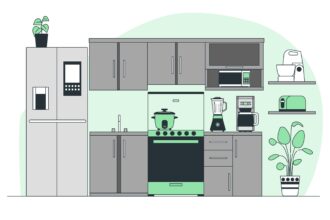Are you tired of throwing money at appliance repairs without seeing any long-term benefits? Do you wish there was a way to extend the lifespan of your appliances while saving some cash in the process? Look no further! In this comprehensive guide, we’ll share 10 valuable tips on how to maintain and repair your appliances efficiently, saving you both time and money.
Tip #1: Create an Appliance Maintenance Schedule
Regular maintenance is key to prolonging the lifespan of your appliances. Set reminders for routine checks and cleaning to prevent breakdowns. Allocate a specific day each month for inspecting and servicing your appliances.
Importance of Scheduling
By scheduling regular maintenance, you can identify potential issues before they escalate into costly repairs. This proactive approach ensures your appliances operate efficiently, reducing energy consumption and saving you money on utility bills.
Tip #2: Clean Appliances Regularly
Dust, dirt, and grime can significantly reduce the performance and lifespan of your appliances. Establish a cleaning routine to remove debris and food residue from appliances like refrigerators, ovens, and dishwashers.
Benefits of Cleaning
Regular cleaning not only prevents breakdowns but also enhances appliance efficiency. Clean appliances consume less energy, reducing your utility bills and environmental footprint.
Tip #3: Check and Replace Air Filters
Clogged air filters can lead to increased energy consumption, reduced airflow, and premature wear on appliances like HVAC systems and vacuum cleaners. Inspect and replace air filters every 1-3 months to maintain optimal performance.
Filter Replacement Frequency
The frequency of replacing air filters depends on usage, pet ownership, and allergies. Refer to your appliance’s user manual for specific guidelines or consult with a professional if unsure.
Tip #4: Defrost Refrigerators and Freezers
Failing to defrost refrigerators and freezers can lead to increased energy consumption, reduced cooling efficiency, and premature component failure. Defrost these appliances every 3-6 months to maintain optimal performance.
Defrosting Methods
Consult your appliance’s user manual for specific defrosting instructions or use the auto-defrost feature if available. Always unplug appliances before defrosting to prevent electrical shocks or injuries.
Tip #5: Inspect and Clean Drainage Systems
Clogged drainage systems can cause water damage, mold growth, and unpleasant odors in appliances like dishwashers and washing machines. Regularly inspect and clean drainage hoses and filters to ensure smooth operation.
Drainage System Maintenance
Check your appliance’s user manual for specific instructions on cleaning drainage systems or consult with a professional if unsure. Preventing clogs can save you from costly repairs and water damage restoration.
Tip #6: Update Appliance Software
Many modern appliances rely on software updates to optimize performance, fix bugs, and enhance security features. Regularly check the manufacturer’s website for available updates and follow their instructions for installation.
Software Update Benefits
Updating appliance software can improve energy efficiency, reduce repair frequencies, and prevent security breaches. Stay informed about the latest updates to maximize your appliance investment.
Tip #7: Perform DIY Repairs (When Possible)
For minor repairs, consider performing DIY fixes to save on labor costs. Research online tutorials, consult user manuals, or contact the manufacturer’s support team for guidance.
DIY Repair Limitations
While DIY repairs can be cost-effective, they may void warranties or lead to further complications if not executed correctly. Always assess your repair capabilities and seek professional assistance when in doubt.
Tip #8: Shop for Energy-Efficient Appliances
When replacing appliances, opt for energy-efficient models with high ENERGY STAR ratings. These appliances consume less energy, reducing your utility bills and environmental impact.
Energy Efficiency Standards
Look for the ENERGY STAR label, which indicates compliance with U.S. Environmental Protection Agency (EPA) energy efficiency standards. Research appliance features, such as smart sensors and eco-modes, to maximize energy savings.
Tip #9: Consider Appliance Refurbishment
Refurbished appliances can offer significant cost savings while maintaining performance quality. Explore certified refurbished appliance options from manufacturers or authorized dealers.
Refurbishment Benefits
Refurbished appliances undergo rigorous testing and repair procedures, ensuring they meet manufacturer standards. This eco-friendly approach reduces electronic waste and supports sustainable consumption practices.
Tip #10: Maintain Appliance Records
Keep a record of your appliance maintenance, repairs, and updates to ensure you can reference important information when needed. Organize receipts, user manuals, and warranties in a designated folder or digital storage space.
Record-Keeping Importance
Maintaining accurate records helps you track appliance performance, identify potential issues early, and provide valuable documentation for warranty claims or insurance purposes.
By incorporating these 10 money-saving tips into your appliance maintenance and repair routine, you’ll be well on your way to extending the lifespan of your appliances while reducing energy consumption and repair costs. Remember to stay proactive, clean regularly, and update software to ensure optimal performance from your appliances.
